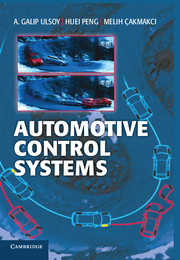Description
Automotive Control Systems
Authors: Ulsoy A. Galip, Peng Huei, Çakmakci Melih
This textbook introduces advanced control systems for vehicles, including advanced automotive concepts and the next generation of vehicles for ITS.
Language: English
Approximative price 74.82 €
In Print (Delivery period: 14 days).
Add to cart
Automotive Control Systems
Publication date: 04-2014
408 p. · 17.8x25.4 cm · Paperback
Publication date: 04-2014
408 p. · 17.8x25.4 cm · Paperback
Approximative price 126.22 €
In Print (Delivery period: 14 days).
Add to cart
Automotive control systems
Publication date: 04-2012
406 p. · 18.3x26 cm · Hardback
Publication date: 04-2012
406 p. · 18.3x26 cm · Hardback
Description
/li>Contents
/li>Biography
/li>
This engineering textbook is designed to introduce advanced control systems for vehicles, including advanced automotive concepts and the next generation of vehicles for ITS. For each automotive control problem considered, the authors emphasise the physics and underlying principles behind the control system concept and design. This is an exciting and rapidly developing field for which many articles and reports exist but no modern unifying text. An extensive list of references is provided at the end of each chapter for all the topics covered. It is currently the only textbook, including problems and examples, that covers and integrates the topics of automotive powertrain control, vehicle control, and intelligent transportation systems. The emphasis is on fundamental concepts and methods for automotive control systems, rather than the rapidly changing specific technologies. Many of the text examples, as well as the end-of-chapter problems, require the use of MATLAB and/or SIMULINK.
Preface; Part I. Introduction and Background: 1. Introduction; 2. Automotive control system design process; 3. Review of engine modeling; 4. Review of vehicle dynamics; 5. Human factors and driver modeling; Part II. Powertrain Control Systems: 6. Air-to-fuel ratio control; 7. Control of spark timing; 8. Idle speed control; 9. Transmission control; 10. Control of hybrid vehicles; 11. Modeling and control of fuel cells for vehicles; Part III. Vehicle Control Systems: 12. Cruise and headway control; 13. Antilock brake systems and traction control; 14. Vehicle stability control; 15. Four wheel steering; 16. Active suspensions; Part IV. Intelligent Transportation Systems (ITS): 17. Overview of ITS; 18. Preventing collisions; 19. Automated highway systems (AHS) and platooning; 20. Lateral active safety systems and automated steering; Appendix A. Review of control theory fundamentals; Appendix B. Two-mass three DOF vehicle lateral/yaw/roll model.
A. Galip Ulsoy is the C. D. Mote, Jr Distinguished University Professor, the William Clay Ford Professor of Manufacturing and the Deputy Director of the Ground Robotics Reliability Center and the Engineering Research Center for Reconfigurable Manufacturing Systems. He has been on the faculty of the Department of Mechanical Engineering at the University of Michigan since 1980 and was the founding Director of the Program in Manufacturing. He served as the Technical Editor of the ASME Journal of Dynamic Systems Measurement and Control and the IEEE/ASME Transactions on Mechatronics and is a member of the editorial board of Mechanical Systems and Signal Processing and several other international journals. Ulsoy is a member of the National Academy of Engineering, a Fellow of the American Society of Mechanical Engineers, the International Federation of Automatic Control and the Society of Manufacturing Engineers, a Senior Member of the IEEE, and a member of several other professional and honorary organizations. He is the past President of the American Automatic Control Council. He is the co-author, with Warren R. DeVries, of Microcomputer Applications in Manufacturing and a co-author of Time Delay Systems. He has published more than 300 refereed technical articles in journals, conference proceedings and books.
Huei Peng is a Professor in the Department of Mechanical Engineering at the University of Michigan. He is also the Executive Director of Interdisciplinary and Professional Engineering Programs. His research interests include vehicle dynamics and control, electromechanical systems, optimal control, human driver modeling, vehicle active safety systems, control of hybrid and fuel cell vehicles, energy system design and control for mobile robots. He holds numerous awards and honors, including the Chang–Jiang Scholar Award, Tsinghua University; the Outstanding Achievement Award, ME Department, University of Michigan (2005); the Best Paper Award, 7th International Symp
Huei Peng is a Professor in the Department of Mechanical Engineering at the University of Michigan. He is also the Executive Director of Interdisciplinary and Professional Engineering Programs. His research interests include vehicle dynamics and control, electromechanical systems, optimal control, human driver modeling, vehicle active safety systems, control of hybrid and fuel cell vehicles, energy system design and control for mobile robots. He holds numerous awards and honors, including the Chang–Jiang Scholar Award, Tsinghua University; the Outstanding Achievement Award, ME Department, University of Michigan (2005); the Best Paper Award, 7th International Symp
© 2024 LAVOISIER S.A.S.




